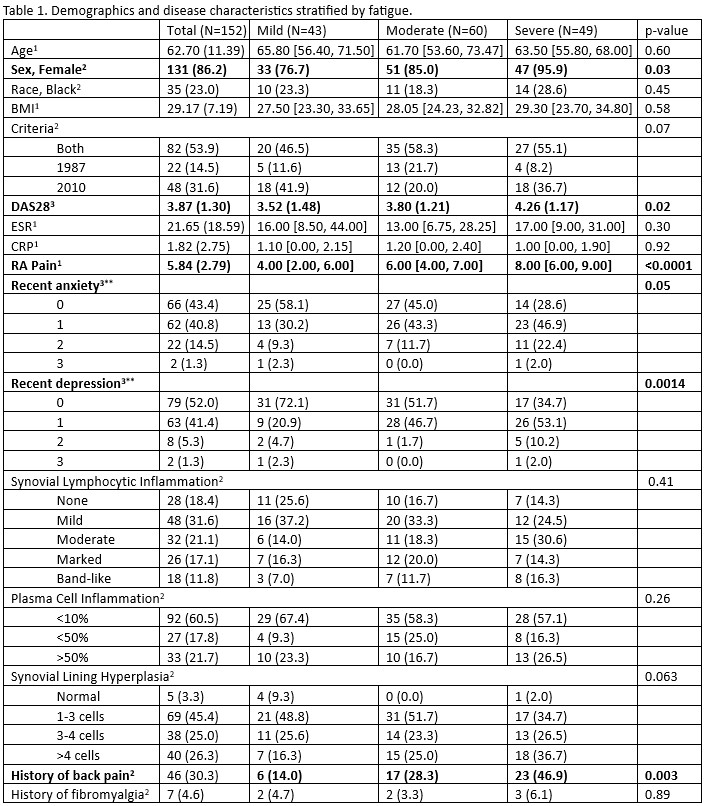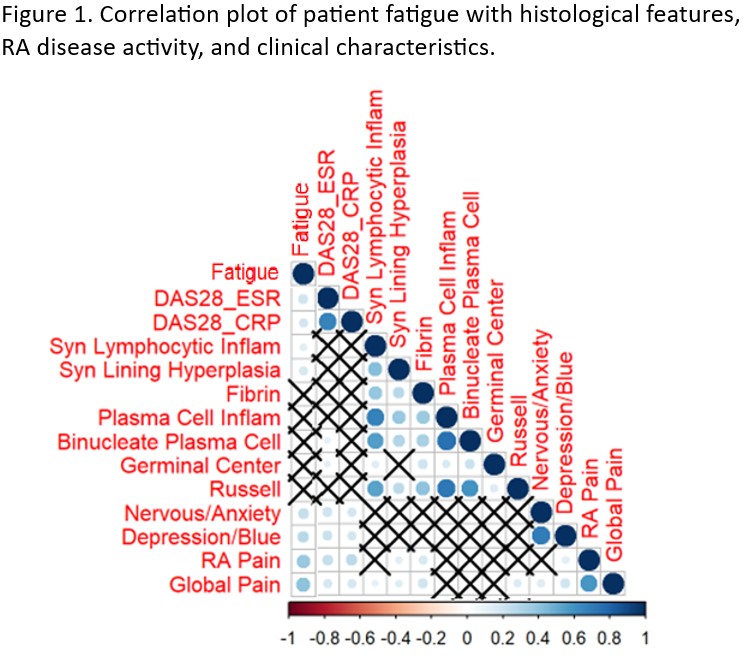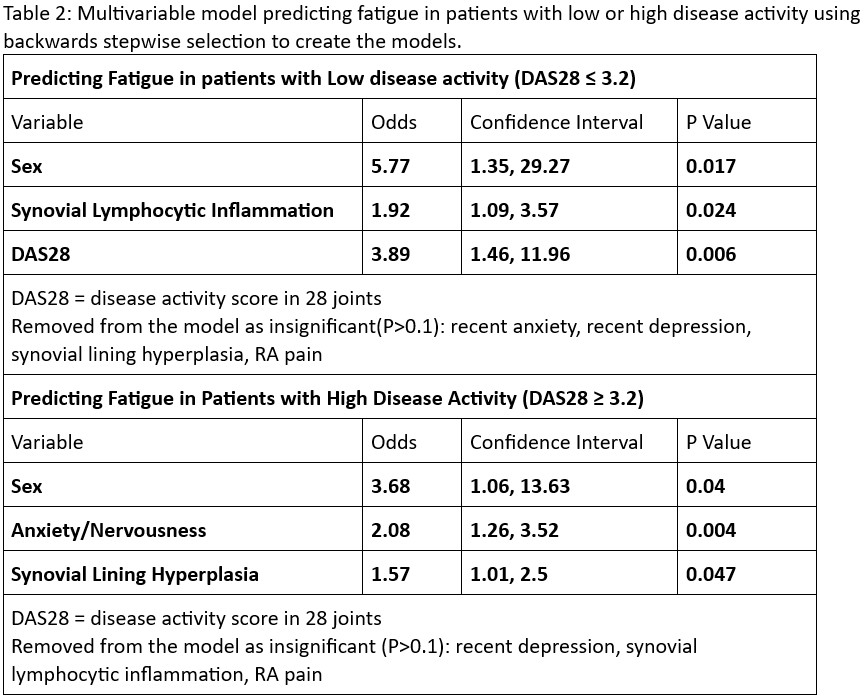Session Information
Date: Monday, November 13, 2023
Title: Abstracts: RA – Diagnosis, Manifestations, & Outcomes II: Comorbidities
Session Type: Abstract Session
Session Time: 2:00PM-3:30PM
Background/Purpose: Fatigue or tiredness is an important symptom for patients with rheumatoid arthritis (RA), yet the factors associated with fatigue are poorly understood and may differ between patients with low vs. high disease activity. We sought to explore whether patient-reported fatigue is associated with histologic changes in the synovium in both low and high disease activity patients.
Methods: 152 patients meeting ACR/EULAR 1987 and/or 2010 RA criteria were recruited prior to elective total joint replacement. At a pre-operative visit, patients were given questionnaires to assess global function and RA disease activity. Patient reported fatigue (“How much of a problem has unusual FATIGUE or TIREDNESS been for you in the PAST WEEK?”) was rated by patients on a 0-10 scale and stratified into mild (0-3), moderate (4-7), or severe (8-10). Patients were also asked how they dealt with depression/feeling blue and nervousness/anxiety over the last week through the Multi-Dimensional Health Assessment Questionnaire (MDHAQ). Demographics, RA characteristics, tender and swollen joints to measure disease activity, erythrocyte sedimentation rate (ESR) and C-reactive protein (CRP) were collected. Hematoxylin and eosin (H&E) stains were prepared from the synovium of the operative joint and 10 characteristics were systematically scored by a pathologist as previously described. Relationships between patient fatigue and studied variables were measured with Kendall’s Tau and compared in patients with high (DAS28>3.2) vs low (DAS28< 3.2) disease activity. Backward stepwise selection and multivariable ordered logistic regression were used to study the association of patient fatigue with other variables.
Results: Of the 152 patients in the study, 86.2% were women, with age 62.7 (±11.4) (mean±SD) years old, disease duration 14.75 (±12.4) years, and DAS28 3.87 (±1.30), indicating overall moderate disease activity. Among mild, moderate, and severe fatigue groups, there were no differences in comorbidities, such as history of diagnosed mental illness, anemia, fibromyalgia, thyroid disease, and cancer (Table 1). However, patients with higher fatigue reported higher recent anxiety and depression. Fatigue was correlated with DAS28, synovial lymphocytic inflammation (SLI), synovial lining hyperplasia, recent anxiety, recent depression, RA pain, and global pain (Figure 1). Of the patients with low disease activity, 46.5% had moderate, marked, or band-like SLI. In multivariable models, fatigue was significantly associated with SLI in low diseases activity patients (1.92[1.09,3.57]; p=0.024) but not with recent anxiety or depression. In high disease activity patients, fatigue was associated with anxiety and synovial lining hyperplasia (1.57[1.01,2.5]; p=0.047) but no other synovial histopathologic features.
Conclusion: In patients with low disease activity, fatigue is associated with chronic lymphocytic joint inflammation but not with anxiety or depression, suggesting an association with subclinical synovitis. In contrast, in RA patients with high disease activity, fatigue is associated with anxiety and synovial lining hyperplasia but not chronic lymphocytic inflammation.
**Questions from the Multi-Dimensional Health Assessment Questionnaire:
Over the last week, were you able to:
Deal with feelings of anxiety or being nervous?
Deal with feelings of depression or feeling blue?
0, Without any difficulty | 1, With some difficulty | 2, With much difficulty | 3, Unable to do
BMI = body mass index; DAS28 = disease activity score using 28 joints; RF = rheumatoid factor; CCP = cyclic citrullinated protein; ESR=erythrocyte sedimentation rate; CRP=C Reactive Protein;
Bolded values significant p<0.05
To cite this abstract in AMA style:
Fisher D, Orange D, Smith M, Mehta B, Spolaore E, DiCarlo E, Sun D, Donlin L, Goodman S. Patient-Reported Fatigue Associated with Joint Histopathology in Rheumatoid Arthritis [abstract]. Arthritis Rheumatol. 2023; 75 (suppl 9). https://acrabstracts.org/abstract/patient-reported-fatigue-associated-with-joint-histopathology-in-rheumatoid-arthritis/. Accessed .« Back to ACR Convergence 2023
ACR Meeting Abstracts - https://acrabstracts.org/abstract/patient-reported-fatigue-associated-with-joint-histopathology-in-rheumatoid-arthritis/



